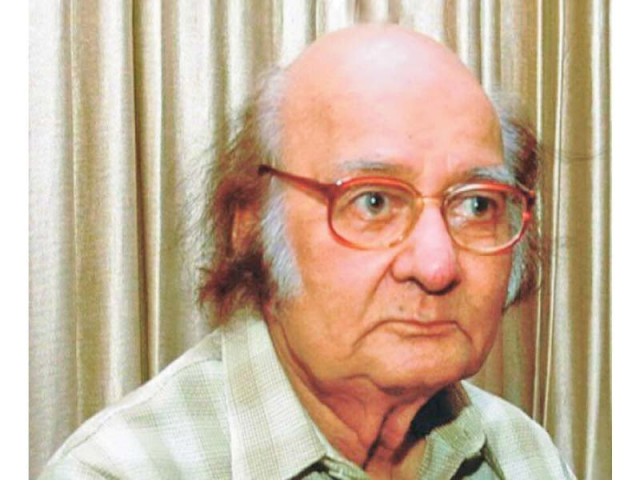Jamil Jalibi — an outstanding researcher and critic
Jalibi had an untiring zeal for writing and was prolific in his literary output

The controversy on this approach to literature had its roots in the creation of Pakistan. After the Partition of India in 1947, we inherited a state but not a nation. On the contrary, there were many ethnicities, cultures, and languages and their diversity and exclusivity were seen as an obstacle or threat to the efforts aimed at evolving a nation. Many of the critics insisted that the common faith that provided the basis for two-nation theory lost its raison d’etre after the cessation of Eastern wing in 1971. But even after seven decades of the country’s existence, the problem still persists.
Muslim states urged to collaborate in scientific and technological research
Dr Jamil Jalibi’s outstanding work, Tareekh Adab Urdu (History of Urdu Literature), was nevertheless a masterly literary exercise in tracing national unity in language and literature. The first volume of his history came out a few years after the breakup of the country. The seeds of this breakup were sown in the language controversy in the early 1950s. The issue of the national language and the status of the regional languages have since the beginning haunted the mind and soul of people in power corridors and academic circles who had, in vain though, been trying to develop theories about Pakistan being a one-nation state and its people adhering to a common culture. Dr Jamil Jalibi was also one of these exponents of the cause of one nation, one culture and one language.
Much before he took up the gigantic but painstaking task of writing this history of Urdu language and literature, Dr Jalibi had tried to espouse this theory of cultural ‘unity in diversity’ through his books - Pakistani Culture aur Adab, Culture aur Masail.
On the one hand, there are scholars who insist that Pakistan being an ideological state should adhere to Islamic or Muslim culture, but nobody knows what this Islamic or Muslim culture is. On the other hand, are the academics who argue that it is the Indo-Iranian culture which is indigenous to the people of Pakistan.
This landed Jalibi into another dilemma. He tried to weave the fabric of Urdu literature/language with Indo-Iranian thread simultaneously believing that it is a religion which could and should form the basis of a nation, however, diversified and divided, ethnically and culturally. With this burden on his mind, Jalibi added four appendices to his book trying to reason out, albeit superficially, a relationship between Urdu and the four regional languages - Punjabi, Sindhi, Pashto, and Balochi.
He writes: “Those imperial powers which are out to dismantle Pakistan, have (since long) been trying to cause a rift among different linguistic groups (of Pakistan) to help achieve their nefarious designs. Their real objective is to weaken the hold of Islam and Urdu - the two forces which have served as a bond of unity. This alone, they believe, can ensure the collapse of the thousand-year-old edifice of ‘Muslim culture’ and then this predator of imperial powers will swallow all the bulls one after the other.”
From a Yusufzai Pathan family of Aligarh, Muhammad Jamil Khan, later to be known as Jamil Jalibi, was born on June 12, 1929. He passed his Matric examination from a school at Saharanpur and Intermediate and graduation from a college in Meerut. The family migrated to Karachi immediately after the Partition where Jamil Jalibi joined Bahaduryar Jang School as a head master but continued his studies to complete his MA and LLB. He earned PhD and D Litt degrees from the Sindh University.
After passing the Central Superior Services examination, Jalibi joined the Income Tax Department and rose to the position of Income Tax Commissioner. He was trained to scrutinise the income and expenditure of others to fetch money for the state coffers. He could smell and see what lay buried in the figures. And when he gave it up, for him figures were simply replaced by words and what lies beyond. He wore many other hats and was Vice-Chancellor of the Karachi University, Chairman National Language Authority and Honorary President of the Urdu Dictionary Board. Many faculty members at Karachi University now recall his tenure with sympathy, claiming that he was able to bring in some financial and administrative discipline in this seat of learning. During all these assignments he continued to edit Nayadaur (New Era), a literary magazine he founded in 1955. He was awarded Sitara-i-Imtiaz (1990) and Hilal-i-Imtiaz (1994) for his services in the field of literature and language.
PU sets up Baba Guru Nanak research chair
He was among 1300 civil servants whom Zulfikar Ali Bhutto thought “either to be non-cooperative or plain and simple, inimical to the Pakistan People’s Party,” and removed them from service as civilian martial law administrator.
Jalibi had an untiring zeal for writing and was prolific in his literary output. But he was always shy of conversation, avoiding interviews, discussions, and gatherings. We never saw him speaking extempore; he would always read from the prepared text even in limited literary gatherings.
Besides his monumental work of the four-volume history of Urdu literature, he authored several other books which included: Qadeem Urdu ki Lughat, Pakistani Culture, Tanqeed aur Tajarba, Nai Tanqeed, Adab, Culture aur Masail, Ma’asir Adab, Eliot kay Mazameen, Arasto say Eliot tak (translation), Janvaristan (translation), Mathnawi Kadam Rao Padam Rao (edited).
Published in The Express Tribune, April 19th, 2019.



















COMMENTS
Comments are moderated and generally will be posted if they are on-topic and not abusive.
For more information, please see our Comments FAQ